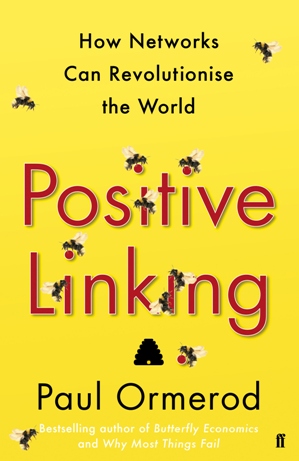“Positive Linking” – A Review by Rhett Gayle
Today our colleague Paul Ormerod is launching his new book, “Positive Linking – Why Networks Can Revolutionise the World” (click here for more).
When I was young, I often wanted to do things that my mother would rather I did not do. When told “no” I would offer what seemed to me should be a winning argument, the argument that “everyone is doing it, Mom.” The ready reply, taught to all parents of a certain generation, was “If everyone jumped off the bridge, would you jump too?” The underlying message was something like, “don’t just copy other people, pay attention to the consequences of your actions, which in this case were undesirable. I remember thinking on one such occasion that if the relevant “everyone” was doing it I would, since they knew what was worth doing and their opinions were far more important than the consequences Mom was so concerned about. Of course the official story is that now that I am a grown up I would never decide do something only because others are doing it, especially if there was an obvious downside. I am now a rational agent able to calculate the best way to achieve my preferences. If someone wants me to do something or not do something, offering the appropriate incentive alters my calculation and there you have it, the right behaviour, freely chosen by me, unless, of course it’s the dog and the wife going for a walk when I should be working, then it’s off I go.
Paul Ormerod, economist and bestselling author of Why Most Things Fail and Butterfly Economics and co-director of Synthesis, points out in his new book Positive Linking, that governments operate on the notion that offering right incentives will produce the outcomes that the government thinks are good, and that when the desired outcomes aren’t forthcoming the incentive scheme is in need of adjustment. Ormerod argues, that the problem is that governments, and economists, are committed to a model of human beings that leaves out the “everyone” that was so important to me as a child. We all operate in the context of networks (the relevant “everyone”) and networks can lead to all kinds of behaviours that amount to jumping off bridges from the perspective of someone outside the network. One of the examples of this offered in the book is people choosing to be Protestant in Britain under Mary Tudor, a decision that could easily result in being burned to death. We cannot really make sense of this from a rational agent perspective. People copy other people in their network, sometimes even when it is not rational in an economic sense to do so.
Contemporary technology amplifies the power of networks to create or inhibit change. The events of the Arab Spring bring this point home. The technology-enabled network of connections encouraged people to ignore incentives (government troops firing on them, for example). Ormerod argues that policy makers and their advisors need a model of economics, and hence decision making, that includes network effects. If not, the current model in use will lead to greater disconnection from reality and hence from the possibility of being effective.
The book is not merely an attack on neoclassical economics and the strategies of governance that flow from it. Instead it offers a clear way to understand how to include networks in our thinking and what some of the consequences of that inclusion are. Network effects do not dominate in all situations; Ormerod offers a good heuristic for being able to tell when networks must be taken into account. He also points out practical ways that networks can be used to create positive change.
From the point of view of neoclassical economists, the introduction of networks is bad news (I suspect Paul won’t have a problem with that, he also wrote a book called The Death of Economics). The idea that a centralized decision making body, aided by a market composed of rational actors, could get the incentives right in some general sense and hence that there is some silver bullet scheme that will solve all our problems must be consigned to the flames. The good news is that in its place is the idea of a less ambitious, more decentralized, more experimental set of strategies for governance. Ormerod argues that in an age dominated by network effects, the principle of subsidiarity is strengthened. Centralization works well when citizens can be treated as atomized individuals, who are basically the same. Network effects mean that this assumption is often wrong, and hence devolving authority and responsibility will allow decisions and actions to be more attuned to reality and hence more effective.
Positive Linking provides a clear and practical introduction to understanding networks and how that understanding can effectively play into good governance and policy making. It does not claim that network theory is the silver bullet that solves all problems but effectively shows that without “everyone” (networks), our thinking about changes in social world are hopelessly flawed. People who are interested in policy, good governance, better economics and advancing the social good will all benefit from reading this book.

